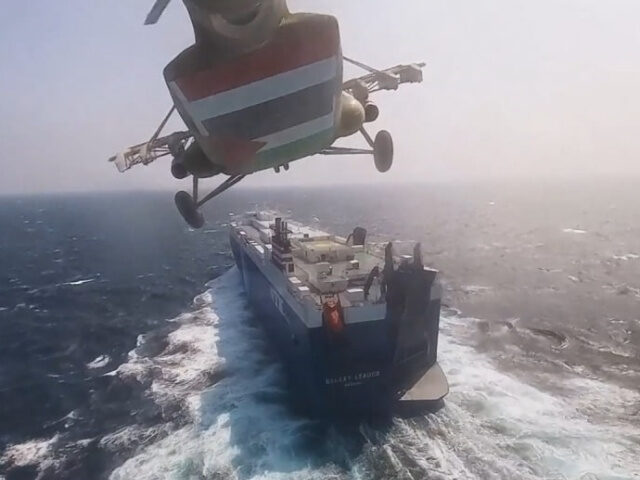A senior member of the Yemeni Houthi terrorist organization declared that the group’s ongoing jihad in the Red Sea, which he described as “spillover” in the conflict between Israel and the terrorist organization Hamas, would “inevitably result in an end to US hegemony.”
The statement was not the first of its kind from the Houthis but does solidify the objective of the Houthi campaign against global commercial shipping as being the destruction of America, not the support of the Palestinian people oppressed by Hamas in Gaza.
The promise to destroy America arrived on Monday in response to targeted airstrikes by the administration of President Joe Biden and the government of the United Kingdom against Houthi assets in Yemen. Multiple rounds of airstrikes have failed to deter the Red Sea attacks, a reality Biden has recognized.
Asked on January 18 if the airstrikes are working, Biden responded, “Well, when you say ‘working,’ are they stopping the Houthis? No. Are they going to continue? Yes.”
RELATED — Pentagon: ‘No Indications’ Houthis Will Stop Attacking
The Houthis announced following the first American and British airstrikes that ships from those countries are “legitimate targets for Yemenis within the fundamental and inalienable right to defend their homeland and nation and in reaffirmation of their staunch support of Palestine.” In reality, the Houthis have not limited themselves to attacking ships that they have overtly declared targets.
A senior Houthi terrorist, Mohammed al-Bukhaiti, of the Houthi “political bureau” declared on Monday that subsequent Western airstrikes, which continued despite the Houthi threats, had “rewritten” the rules of engagement with America and Britain.
“The spillover of the [Gaza] will inevitably result in an end to US hegemony across the region,” Bukhaiti said, according to the Iranian state propaganda outlet PressTV.
Another Houthi official, “Information Ministry adviser” Tawfiq al-Hamiri, similarly said in remarks to the Russian state outlet Sputnik in January that his gang was “preparing for a response that will end the U.S. hegemony forever.”
PressTV reported on Monday that the Houthi’s “national salvation government,” an illegitimate political entity in Sana’a, issued a statement asserting that the terrorists would not stop their attacks on ships in the region in response to the airstrikes.
“These assaults won’t ever make the Republic of Yemen do a volte-face on its humanitarian and ethical duties concerning Palestinians and their cause,” a statement by the Houthi “foreign ministry” read. The Houthis falsely consider themselves the legitimate government of Yemen, a fantasy that Tehran indulges.
Central Command, the Pentagon wing responsible for Middle East operations, announced on Saturday that it had conducted a new wave of airstrikes in Yemen intended to reduce the Houthis’ capability of launching missiles at nearby ships. Central Command claimed the strikes successfully destroyed an anti-ship cruise missile that it found “presented an imminent threat to US Navy ships and merchant vessels in the region.” American military sources also confirmed more airstrikes on Sunday, targeting missiles that the terrorists could launch at maritime targets.
In response to the airstrikes, a Houthi “foreign ministry” spokesman declared on Monday, “The United States is the first and foremost threat to shipping in the Red Sea, and it was the first party that militarized the region.”
PressTV reported, “The senior Yemeni official added that his country’s military forces will not hesitate to respond to any act of aggression against their homeland.” The official then added the often-repeated promise that “international shipping companies are safe to sail their vessels in the area.”
The Houthis – a Shiite terrorist operation that seized control of Sana’a, the capital of Yemen, in 2014 with the backing of Iran – declared war on Israel in October in a gesture of support to Hamas. On October 7, Hamas terrorists invaded Israel and engaged in an unprecedented terrorist slaughter, killing an estimated 1,200 people, abducting about 250, and engaging in acts of torture, gang rape, and desecration of corpses. Hamas supporters in much of the Middle East responded to the atrocities by marching in the streets and condemning Israel’s self-defense operations in Gaza in response.
The official Houthi slogan is “Allahu Akbar, Death to America, Death to Israel, Curse on the Jews, Victory to Islam.”

Houthi supporters step and walk on a representation of the U.S. flag during a demonstration outside the closed U.S. embassy against the United States over its decision to designate the Houthis a foreign terrorist organization in Sanaa, Yemen, Monday, Jan. 18, 2021 (AP Photo/Hani Mohammed).
At the time of the Houthi declaration of war, spokesman General Yahya Saree announced that the terrorists had launched a “large number of ballistic and cruise missiles” at Israel to support the “oppressed brothers in Palestine [sic],” meaning the Hamas-occupied territory of Gaza.
“The position of our Yemeni people towards the cause of Palestine is fixed and principled, and the Palestinian people have the full right to defend themselves and use their full rights,” Saree said at the time. “Our forces performed their duty in supporting Gaza and fired ballistic and cruise missiles at enemy targets in the Occupied Territories.”
Shortly after the war declaration, the Houthis began using Yemen’s position on the Bab el-Mandeb Strait leading to the Red Sea to attack commercial shipping vessels. Houthi leaders insisted they would only attack Israel-linked ships, but they soon began shooting missiles at ships with no clear ties to Israel or its allies, leading to global shipping giants rerouting their ships along the longer and pricier route around the Cape of Good Hope in South Africa.
Even attempts at assuaging the concerns of Iran-allied rogue states have failed to ensure the security the Houthis continue to promise for unrelated parties. In January, Houthi leaders publicly stated they would not target Chinese- or Russian-flagged ships navigated near the Red Sea, asserting that those countries were not a threat to their movement. In late January, Russia even hosted some members of the Houthi terrorist group in Moscow for talks on the situation in the Middle East. Less than a week later, reports surfaced that the Houthis had attacked a ship with missiles that, while not Russian-flagged, was carrying Russian cargo – namely petrochemicals critical to Moscow’s outsized fossil fuel industry.
The attacks resulted in a 90 percent drop year-on-year in container ship traffic through the Red Sea and Suez Canal between January 2023 and 2024 and soaring shipping prices. The United Nations reported in late January that it had documented a 45 percent drop in two months in freight volume through the Suez Canal, which lies on the northern tip of the Red Sea. Multinational shipping corporations, such as Maersk, announced a major redirection of ships despite assurances from the Biden administration that the American military would protect civilian ships as part of “Operation Prosperity Guardian,” a coalition of allied navies.
RELATED — Biden Co-Chair: ‘No Surprise’ We Haven’t Deterred Houthis Yet

COMMENTS
Please let us know if you're having issues with commenting.